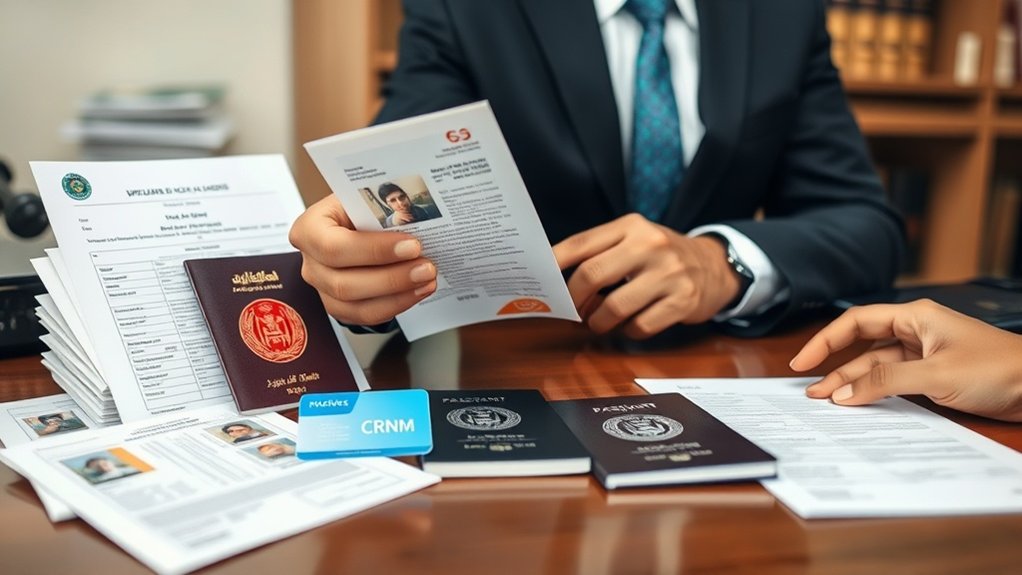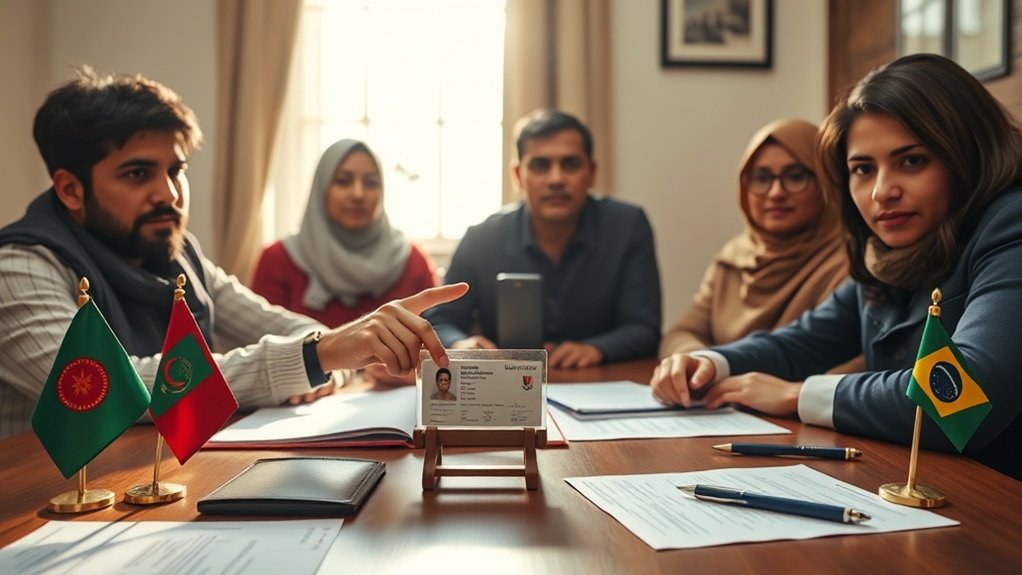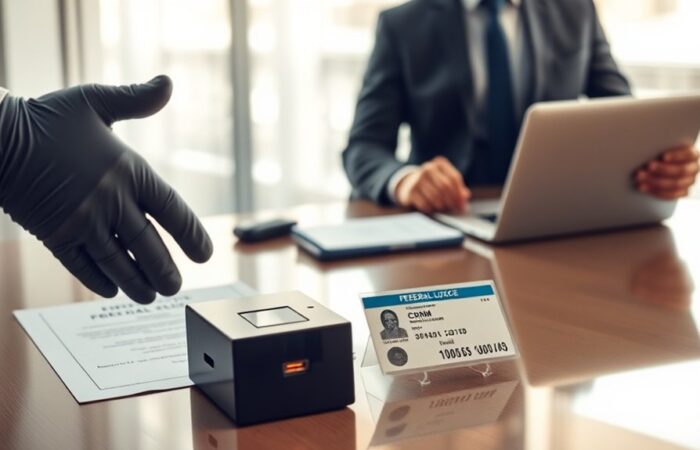If you’re an Afghan national trying to settle in Brazil, understanding how to secure your CRNM—or Resident ID—can feel overwhelming. It’s not just about paperwork; your legal residency, access to essential services, and ability to build a life here all depend on it. That’s where Vieira Braga Advogados can make a difference. You’re probably wondering what documents you’ll need, the potential challenges, and how to avoid delays…
Understanding the CRNM: What Is It and Who Needs It

Although moving to a new country comes with many challenges, understanding the CRNM—short for “Carteira de Registro Nacional Migratório”—is crucial for Afghans living in Brazil. The CRNM is essentially your official Resident ID card. As someone living in Brazil but born elsewhere, you’ll need this document to prove your legal residence status. It’s issued by the Federal Police and contains details like your photo, personal information, and immigration status. This card replaces the old RNE (Registro Nacional de Estrangeiro).
If you’re an Afghan national who arrived as a refugee, asylum seeker, or through another migration program, you’ll need a CRNM regardless of your age. Children and adults alike must have one, as it serves not only for identification but also for staying compliant with Brazilian immigration law. If you plan to live, study, or work in Brazil, securing your CRNM should be one of your first priorities. Enlisting help from specialized legal support can ensure you avoid common mistakes and complete the process efficiently, providing peace of mind as you settle into your new life.
Key Benefits of Obtaining a CRNM in Brazil
With a CRNM, you can access important social services and support systems in Brazil. You’ll also get legal authorization to work, which opens up job opportunities. These benefits make settling into your new life much smoother. Additionally, obtaining a CRNM helps ensure compliance with complex and changing immigration laws, minimizing the risks of legal issues or sanctions in Brazil.
Access to Social Services
Once you have your CRNM in Brazil, you gain access to a wide range of essential social services that support your well-being and integration. With this document, you can register for Brazil’s public health system (SUS), where you’ll receive medical care, vaccinations, and emergency services. You’ll also have the right to enroll your children in public schools and benefit from educational programs, making it easier for your family to adjust and thrive.
Additionally, your CRNM allows you to apply for government assistance programs if you qualify, such as Bolsa Família or other support initiatives. You won’t face barriers to basic social protection, community support, or public assistance programs. By holding a CRNM, you empower yourself and your family to fully participate in Brazilian society.
In addition, it is important to understand that registering with Federal Police is a required step within 90 days of arrival and is essential for obtaining your CRNM and ensuring your legal status in Brazil.
Legal Work Authorization
Securing your CRNM unlocks the ability to work legally in Brazil, opening doors to job opportunities and financial independence. With this resident ID, you can apply for jobs in both the public and private sectors, free from the risks associated with unauthorized employment. Employers recognize the CRNM as proof of your legal status, which increases your chances of fair treatment and access to labor rights. You’ll be eligible for a work permit, allowing you to sign formal employment contracts and receive lawful benefits, such as health insurance, paid leave, and contributions to social security. By obtaining your CRNM, you’re not just meeting legal requirements—you’re taking crucial steps toward building a secure, stable, and self-sufficient life in Brazil. With the help of specialized legal support, you can navigate all requirements effectively, maximize your chances of success, and ensure full compliance with Brazilian immigration laws.
Essential Documentation Required for Afghan Applicants

To start your CRNM application, you’ll need to gather certain documents. Make sure you have valid personal identification and something that proves your address in Brazil. Professional legal support can ensure that essential documents are correctly prepared, increasing the likelihood of a successful residency application. Let’s look at what’s required for each.
Mandatory Personal Identification Documents
Every Afghan applicant needs to gather specific personal identification documents before applying for the CRNM in Brazil. You’ll need a valid passport or a recognized travel document issued by Afghan authorities or international agencies. If your passport isn’t current, provide any documentation confirming your identity, such as a tazkira (Afghan national ID) or any UNHCR-issued identification if you’re a refugee. Also, have your birth certificate ready, as it helps verify your personal details. Make sure all documents are originals or certified copies and, if not in Portuguese, officially translated. Double-check that your photos match Brazilian immigration requirements. These documents prove your identity, age, and nationality, which are fundamental for every stage of your CRNM application and approval process. Prepare these items carefully to avoid delays. Consulting an immigration lawyer is highly recommended, as professional guidance increases your chances of a successful CRNM application.
Proof of Address Requirements
While collecting your documents for the CRNM, you’ll also need to show proof of your current address in Brazil. This is a critical requirement, as Brazilian authorities must confirm where you’re living. The document must be recent—normally issued within the last three months. If you don’t have utility bills in your name, you can use a declaration from the property owner or your landlord, along with their ID and proof of address.
Here are three types of acceptable documents:
- Utility bill (electricity, water, gas) in your name, dated within the last three months.
- Rental contract, signed by both parties, and accompanied by the landlord’s ID.
- Signed address declaration (Declaração de Residência) from the property owner with supporting documents.
Always bring originals and clear copies to your appointment. To avoid legal repercussions such as delays, fines, or even the risk of deportation, make sure your address documentation is accurate and meets all requirements.
Step-by-Step Process to Apply for the CRNM
After arriving in Brazil, you’ll need to follow several important steps to apply for the CRNM (Carteira de Registro Nacional Migratório). First, gather your required documents, such as your passport, visa or entry permit, proof of address, and recent passport-sized photos. Next, schedule an appointment with the Federal Police (Polícia Federal) through their online system. Print the appointment confirmation and complete the official CRNM application form available on the Federal Police’s website.
On the day of your appointment, arrive early at the designated Federal Police office. Bring all documents, including originals and copies, and your completed application form. At the appointment, you’ll submit your documents, provide biometrics, and answer a few simple questions about your arrival and intentions in Brazil. Once you’ve completed these steps, you’ll receive a protocol number for tracking your application. The Federal Police will notify you when your CRNM is ready for pick-up.
If you have doubts or experience difficulties with documentation or deadlines, seeking the assistance of a professional immigration lawyer can increase the chances of a successful application.
Common Challenges Faced by Afghan Nationals

Although Brazil offers a welcoming environment for migrants, Afghan nationals often encounter specific challenges during the CRNM application process. If you’re navigating this process, you might find that language barriers and documentation issues can slow your progress. Bureaucratic hurdles sometimes add confusion or frustration, especially when requirements aren’t clear or change unexpectedly.
Here’s a look at some of the most common obstacles:
- Language Barriers: Many official documents and communications are in Portuguese. If you’re not confident in the language, this can make understanding forms and instructions quite difficult.
- Document Verification: Afghan applicants may have trouble obtaining original documents due to circumstances in Afghanistan. Verifying the authenticity of available paperwork can become a significant stumbling block.
- Procedural Delays: Processing times may be longer for Afghans, either due to additional security checks or complexities unique to refugee and humanitarian cases.
Additionally, seeking specialized legal guidance can help Afghan applicants avoid many of these challenges and increase the likelihood of a successful CRNM application.
How Vieira Braga Advogados Supports Afghan Applicants
Faced with these challenges, many Afghan nationals turn to Vieira Braga Advogados for guidance throughout the CRNM application process. You’ll find that the firm offers clear, step-by-step support to help you navigate the Brazilian bureaucracy. From the moment you contact them, they assess your situation, explain required documents, and outline the process in language you can understand. They’re proactive in addressing common pitfalls, like missing paperwork or translation issues, to prevent delays.
Vieira Braga Advogados also handles communication with authorities, making sure all your paperwork is correctly submitted and deadlines are met. If you encounter obstacles, their team responds quickly, providing tailored solutions rather than generic advice. They keep you informed at every stage, so you’re never left wondering about the status of your application. With this personalized approach, you gain confidence and peace of mind, knowing you have experienced professionals advocating for your residency in Brazil. Relying on their specialized guidance significantly increases your chances of a successful immigration outcome and helps protect your rights throughout the process.
Real-Life Success Stories and Client Experiences

When Afghan families reach out to Vieira Braga Advogados, they often share stories of uncertainty and hope in starting a new life in Brazil. You might find yourself wondering if others have faced similar challenges or succeeded in obtaining their CRNM (Resident ID). Hearing real-life experiences can be reassuring and inspiring. Clients frequently express relief and gratitude after navigating the Brazilian immigration process with the firm’s support. Here’s how others in your situation have benefited:
- They received clear, step-by-step guidance, which helped them avoid common errors and delays.
- With professional representation, their applications gained credibility, increasing their approval chances.
- Many families felt empowered and less anxious as the team handled appointments, document translations, and official communications.
These stories highlight how professional legal assistance can make your immigration journey smoother. You’re not alone—countless Afghan families have found stability in Brazil thanks to the right legal support.
Next Steps After Receiving Your CRNM
Once you receive your CRNM, you unlock essential rights and new responsibilities as a resident in Brazil. Now, you can legally reside, work, and access public services like healthcare and education. It’s important to keep your CRNM with you and update your address with the Federal Police whenever you move. Without this, you might face fines or complications.
Next, you should register for a CPF (Brazilian tax ID), if you haven’t already. A CPF is crucial for opening bank accounts, signing contracts, and virtually any formal transaction in Brazil. Consider enrolling in Portuguese classes to help with daily life and integration. Stay aware of your CRNM expiration date—remember to renew it on time to maintain your legal status. Finally, familiarize yourself with local laws and customs, ensuring you uphold your rights while fulfilling your responsibilities as a resident, making your life in Brazil smoother and more secure.
Frequently Asked Questions
How Long Does the CRNM Remain Valid Before Renewal Is Required?
The CRNM usually remains valid for up to nine years if you’re over 18, but for minors, it’s valid for five years. You’ll need to check the “validade” date on your card since this can vary based on your specific situation. Don’t wait until the last minute—start your renewal process a few months before your expiration date to avoid issues with your residency status or facing fines for overstaying.
Is It Possible to Work in Brazil While Waiting for My CRNM?
Yes, you can work in Brazil while waiting for your CRNM, as long as you’ve already applied for it and have your provisional protocol document. This protocol acts as a temporary ID and grants you the same rights as residents, including the ability to work. Make sure you keep your protocol updated and present it to employers when needed. Once your CRNM is issued, switch to using that as your official identification.
What Happens if My CRNM Application Is Denied?
If your CRNM application gets denied, you’ll receive a notification explaining why. You should review the reasons carefully and decide if you want to file an appeal or provide more documents to address the concerns. While your appeal’s in process, you might still have certain rights to remain temporarily, but you should act quickly. Consulting a qualified immigration lawyer helps you understand your options and the best way forward to correct your status.
Can Family Members Be Included in a Single CRNM Application?
You can’t include your family members in a single CRNM application. Each family member, regardless of age, must submit their own individual application for a CRNM in Brazil. You’ll need to ensure everyone has the required documents, such as identification and proof of residency status. While you can help with gathering paperwork and scheduling appointments, each person’s application will be processed separately by the authorities. This process ensures correct identification for all.
Are There Any Fees for Replacing a Lost or Stolen CRNM?
Yes, you’ll need to pay fees if you want to replace a lost or stolen CRNM. The Brazilian government charges a specific fee for issuing a replacement card, which covers administrative costs. You should make sure to check the most up-to-date value on the official Brazilian Federal Police website before starting your application. Keep your payment receipt, since you’ll have to show it when submitting your documents for the replacement process.
Conclusion
Getting your CRNM is a vital step toward a stable life in Brazil, giving you access to essential rights and services. With Vieira Braga Advogados guiding you, you’ll avoid common pitfalls and ensure your documents are in order. Their expertise makes the journey much smoother, allowing you to focus on building your new life with confidence. Don’t let challenges hold you back—let experts handle the process so you can embrace your future in Brazil.






